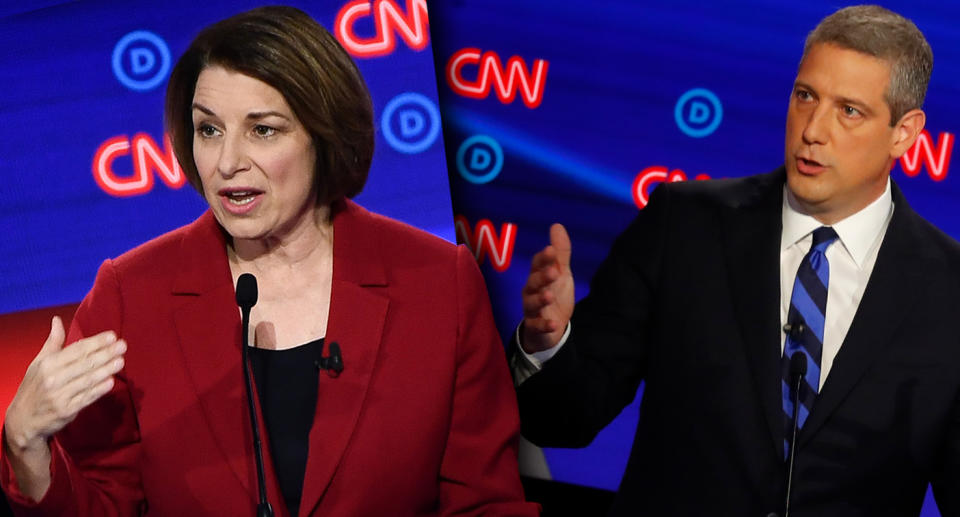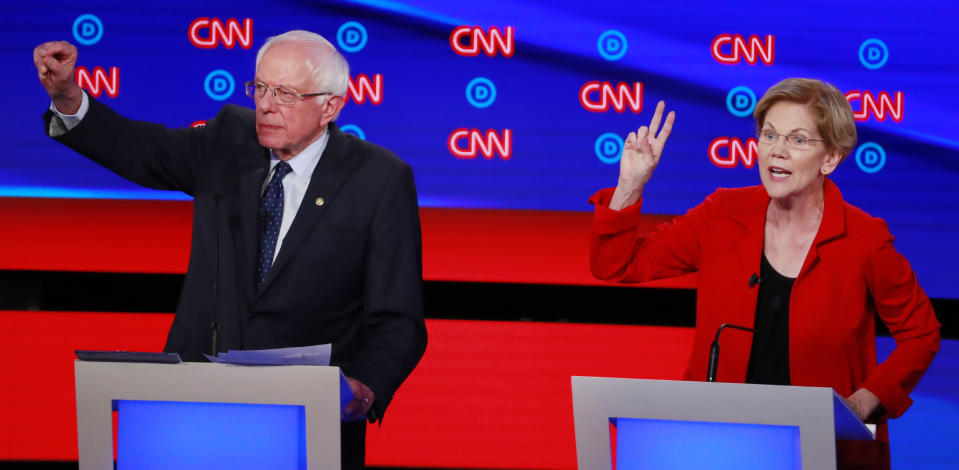Moderate Democrats try to slow party's sprint to the left
The battle for the soul of the Democratic Party was on full display Tuesday night as a group of moderate candidates sought to constrain the party’s leftward surge regarding health care, immigration, taxes, higher education, climate change and race that they worry will cost it the election.
“We are more worried about winning an argument than winning an election,” Sen. Amy Klobuchar, D-Minn., said.
Klobuchar was one of several Democrats who repeatedly clashed with the party’s two most progressive candidates for president — Sen. Bernie Sanders and Sen. Elizabeth Warren — over Medicare for All, health benefits for undocumented immigrants and decriminalizing border crossings.
Rep. Tim Ryan, D-Ohio, talked about the union workers in his home state, which has been hard hit by plant and factory closings for years due to globalization and outsourcing.
“These union members are losing their jobs, their wages have been stagnant, the world is crumbling around them — the only thing they have is possibly really good health care,” Ryan said. “And the Democratic message is going to be, ‘We’re going to go in and the only thing you have left, we’re going to take it and we’re going to do better.’
“I do not think that’s a recipe for success for us. It’s bad policy and it’s certainly bad politics,” Ryan said.
Former Colorado Gov. John Hickenlooper ridiculed Sanders’s proposals on health care and climate change.
“The Green New Deal makes sure that every American’s guaranteed a government job if they want. That is a disaster at the ballot box,” Hickenlooper said. “You might as well FedEx the election to Donald Trump.”

Sanders responded that current polling has him beating Trump in most cases, including in key Rust Belt states like Wisconsin, Michigan and Pennsylvania.
Ryan, however, pushed back.
“Hillary Clinton was winning in the polls too,” he said. “To take a snapshot in the polls today and apply it 16 months from now or whenever it is, I don’t think is accurate.”
“Now in this discussion already tonight we’ve talked about taking private health insurance away from union members in the industrial Midwest, we’ve talked about decriminalizing the border, and we’ve talked about giving free health care to undocumented workers when so many Americans are struggling to pay for their health care. I quite frankly don’t think that that is an agenda that we can move forward on and win,” Ryan said.
“We’ve got to talk about the working-class issues, the people that take a shower after work, who haven't had a raise in 30 years. If we focus on that, we’ll win the election,” Ryan said.
Warren and Sanders, however, repeatedly drew sustained applause when they dismissed these concerns as cowardly and weak.
“You know, I don’t understand why anybody goes to all the trouble of running for president of the United States just to talk about what we really can’t do and shouldn’t fight for,” Warren said, in brushing off former Rep. John Delaney’s criticism of her health care proposals.
Sanders, likewise, rebuked the moderate Democrats.
“I get a little bit tired of Democrats afraid of big ideas. Republicans are not afraid of big ideas,” Sanders said. “They could give $1 trillion in tax breaks to billionaires and profitable corporations. They could bail out the crooks on Wall Street. So please don’t tell me that we cannot take on the fossil fuel industry. And nothing happens unless we do that.”

Author Marianne Williamson seemed to address the moderate Democrats as well when she questioned the progressive credentials of some on the stage.
“I almost wonder why you’re Democrats. You seem to think there’s something wrong about using the instruments of government to help people,” Williamson said.
This divide in the party showed up again and again. Former Rep. Beto O’Rourke said he was not in favor of Sanders’s proposal to pay for free college, but that he would sign a proposal from Rep. Sheila Jackson Lee to enact reparations for slavery.
Williamson talked about her idea to spend between $200 billion and $500 billion for reparation payments to descendants of slaves in the U.S.
But polling does show that large numbers of the Democratic Party’s most reliable voters, namely minority voters, are actually much more moderate than higher-income, highly educated white liberals, on a wide range of these issues.
“What the data demonstrates is that the group containing the largest proportion of minority voters is the most skeptical of some of the most progressive policies embraced by Democratic candidates like Elizabeth Warren, Bernie Sanders and Kamala Harris,” Tom Edsall, a New York Times opinion columnist, wrote last week.
On immigration, for example, the Center for American Progress, a liberal think tank, cautioned that Democrats have “have ceded powerful rhetorical ground to immigration restrictionists, who are happy to masquerade as the sole defenders of America as a nation of laws.”
However, Ryan’s opening and closing statements both stretched to try to find ways to present moderation as forward-looking and not an acceptance of the status quo.
“This is about new and better, and it’s not about reforming old systems,” Ryan said. “It’s about building new systems. And tonight, I will offer solutions that are bold, that are realistic and that are a clean break from the past.”
But coming off as bold, in fact, might be the biggest challenge for moderate Democrats in 2020.
_____
Download the Yahoo News app to customize your experience.
Read more debate coverage from Yahoo News:
Sanders, Warren open debate by defending Medicare for All against rivals
Sanders shrugs off suggestion he's too extreme to beat Trump
Bullock says Warren's border plan is 'playing into Donald Trump's hands'
Marianne Williamson says slavery reparations is ‘a debt that is owed'
Buttigieg: History will judge GOP harshly if they fail to stand up to Trump
7 times Pete Buttigieg highlighted his age at the Democratic debate
Global warming has its moment in the sun at Democratic debate
Charles Barkley says ‘both parties suck’ at delivering for black voters
John Delaney insists he has a ‘great chance’ to win the election




